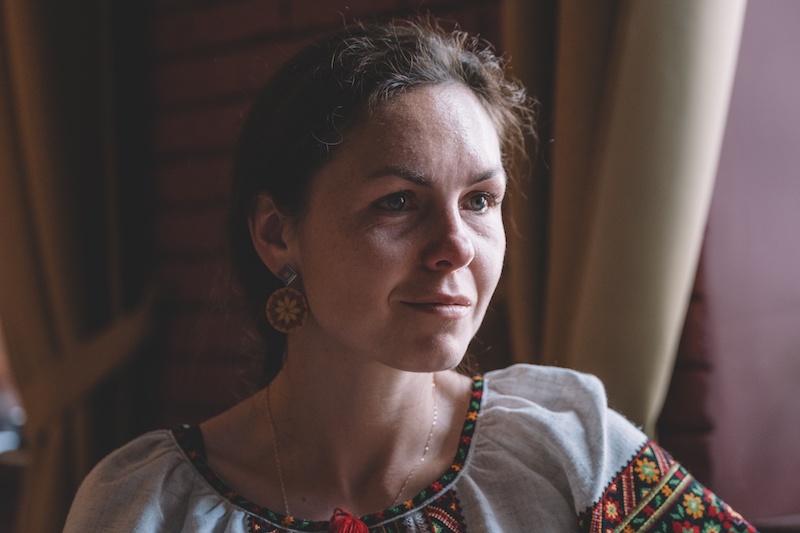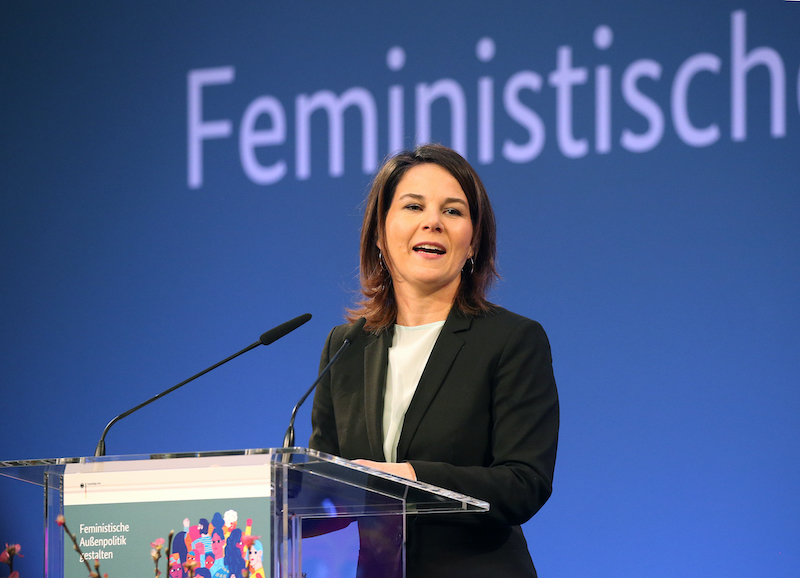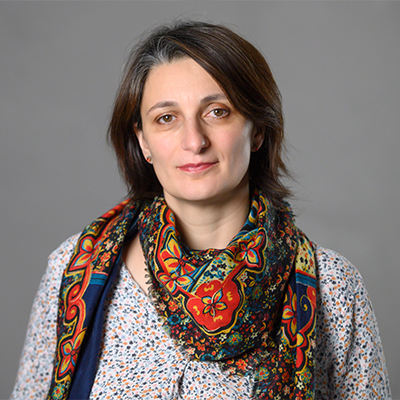Hi from Targu Mures/Marosvásárhely,
‘If one is lost, we will all perish’ – this is what Romanian women shout when they protest against the growing number of femicides in the country.
There is a deep recognition and a deep fear in that desperate sentence. The defence of women’s rights is linked at both a national and global level. So is the violation of those rights. If there is no social security and no justice in the so-called free and democratic states, what can we expect when a war is raging?
This is the subject of the following texts, which chime with International Women’s Week: in an era of collapsing economies and failing states, all our hope lies in civic awareness, global responsibility and a sisterhood that knows no borders.
From Paris to Tallinn, from Kyiv to Madrid, the lesson is this: defending women’s rights means defending society as a whole.Boróka Parászka
this week’s Editor-in-Chief

Tamara, 34, has a delicate frame, an elegant face and a bright smile. She is always happy to have her picture taken, loves talking to her six-year-old son about different car brands, and collects vintage Ukrainian clothes and accessories. She still wears a wedding ring, despite recently becoming a widow, like thousands of other Ukrainian women after a year of full-scale war.
Her husband Oleksiy Yanin was a world champion in Thai boxing ― and a soldier with the Azov regiment since 2014. Azov defended the frontline in some of the most intense moments of the war so far, and last April its soldiers were surrounded by the Russian Army in Mariupol. Oleksiy died there.
Tamara had a hard time coping with his death. She didn’t even kiss him goodbye at the train station on the morning of 24 February, when she last saw him. “Everything I do now is for you, about you, in the name of your memory,” she writes in messages to Oleksiy, which he will never read. Her gratitude and pride have become stronger than pain. Caring for others is what gives her strength now.
A month after Oleksiy’s death, she began to take care of the families of other dead Azov soldiers. Tamara met them in chat rooms where relatives were discussing how to identify bodies and bury their remains. Many of these women used to live in the now-occupied territories, so they lost not only their husbands or sons, but also their home, belongings and their livelihoods. Tamara began collecting clothes, food, medicine, hygiene products and books for women and children displaced by war, and helps them find jobs and a place to stay. In a room she uses as a location for goods and aid, the walls are covered with widows’ phone numbers.
“I just love all of them, unconditionally. I understand them like no one else. And this is how I thank their husbands,” says Tamara. She has stepped out of her role as a traditional wife and a mother of a son on maternity leave, and has become a “collective mother”, supporting women united by grief and loss.

30 out of the 101 seats in the Estonian parliament will be occupied by female candidates after last week’s general election. This matches the average political representation of women in the EU.
Even though the sitting Prime Minister Kaja Kallas earned a record-breaking 31,800 votes, just 13 out of the 37 seats won by her Reform party will be taken by women.
Still, 30 female deputies is the highest number of women ever to be elected to the parliament in Tallinn. Progress to gender equality follows a slow and winding road, even though, this time, there appeared to be more public calls to the electorate to cast their votes in favour of a female candidate.

“We are strong, we are proud, we are feminist, radical and angry”. In recent weeks, this classic hymn of feminist protest has echoed through demonstrations against the Government’s pension reform. Women are at the forefront of dissent to the policy, which plans to raise the legal retirement age from 62 to 64 and to increase the number of active years required to obtain a full pension.
Women will be the biggest losers. In France, as elsewhere, women’s careers are often interrupted. They are the ones who take breaks from work to bear and raise children. They also tend to be the ones who work part-time to care for sick or ageing family members. Plus they are often shut out of leadership roles or positions of responsibility, which are largely entrusted to men.
The consequences of this sexist career structure are economic: women in France earn on average 15.8% less than men. It is even worse once they reach retirement age: women’s pensions are 28% lower on average than those of men.
The pension reform risks reinforcing these inequalities by asking women to work longer. Even the Minister Delegate for Parliamentary Relations, Franck Riester, has acknowledged that “women are somewhat penalised by the postponement of the legal retirement age”.
Other factors also play a role, such as the non-recognition of the arduous nature of certain jobs, mostly carried out by women, which deprives them of obtaining early retirement.
In the protests, women’s collectives are hijacking songs and choreographing militant dances to make these inequalities more visible. This year, the traditional Women’s Day demonstration on 8 March has a socially conscious slogan: the abandonment of this anti-feminist pension reform.

“I have always wondered what a trigger this little word ‘feminist’ is. What we are striving for with these guidelines is something that should actually be self-evident in the 21st century.
Women make up half of the society in any country. A feminist foreign policy is therefore not a fighting term, it is derived from our constitution. And it’s certainly not trivial. It is a hard security issue.”
Germany’s Foreign Minister Annalena Baerbock presented the guidelines for her envisioned “feminist foreign policy” last week. Political opponents have derided her for the creation of what they felt was another meaningless buzzword, with one of them calling it the “emotional gratification of domestic politics”.
Yet, Baerbock’s goals are simple: to create a foreign policy in which the human aspect prevails. That means bringing women to the forefront: “When women are safer,” she said, “Everyone is safer.”

I became a ‘feminist’ because of rage. When a child, I only cried publicly when I perceived something was unjust. Like knowing it was much easier to be a boy than a girl. Boys were allowed to do more things. Later, I put names to those feelings and concepts: feminism.
In adulthood, I tried to navigate all the contradictions, from being raised in a sexist world (I still prefer the Spanish word: machismo) to overcompensating with thoughts such as ‘I’m not a victim’ and ‘I’m succeeding because of my personal effort’ and so on. But it’s not only personal effort, but the effort of so many women before us.
Spain is one of the most progressive countries in terms of law: the Government has just proposed a law making parity in electoral lists mandatory. It has one of the longest paternity leaves in Europe (non-transferable), and so on. Not bad for a country that some in Europe still perceive as Catholic-conservative, is it?
Maybe the laws were introduced too early and society wasn’t prepared, some say. There is still ‘machismo’ in Spain. In everyday life, in the streets where women face harassment, in the wives still beaten by their husbands, the social pressures and expectations on women, we still suffer.
I would be happy for the day when a woman can be as mediocre as a man and still access the same opportunities. Some men say to women like me in Spain, who ask for more equal rights: ‘Spain is one of the most ‘feminist’ countries, why don’t you go to Iran to protest? There they have problems, not here’.
But I am radically convinced that you don’t have to wait for a society to ‘be prepared’ to start making changes, especially when they’re about justice and equality. Spanish society will surely catch up with the mindset that has drawn up these new laws.
I know there are countries where the conditions of women are worse than in Spain. But now is the time to speak about our rights and duties, and where room for improvement is needed, supported by the laws and beyond them.
Thanks for reading the 22nd edition of European Focus,
There are situations when you cannot back down. There can be no compromise at the expense of social security. Fair laws only protect a fair society.
Women and children cannot be left without support in times of war. I hope that our articles have helped to illustrate this.See you next Wednesday!
Boróka Parászka






